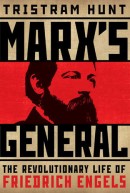A weekly roundup of noteworthy reviews from other sources.
 The Economist says that a new book about the relationship between Karl Marx and Friedrich Engels does “a brilliant job of setting the two men’s endeavours in the context of the political, social and philosophical currents at the time.” The friendship certainly had its share of irony. Engels worked in a family business he hated to support Marx’s writing. (”For the next 20 years Engels worked grumpily away, handing over half his generous income to an ever more demanding Marx.”) . . . Alice Munro’s new collection of stories, Too Much Happiness, won’t be out in the U.S. until mid-November, but reviewers in the UK are sizing it up. (“there’s a persistent idea of her as an underpraised housewife-genius from the Canadian backwoods, perhaps because it’s easier to talk about the literary politics of being a woman, Canadian or a short-story writer than it is to give a sense of her densely packed but effortless-seeming work.”) . . . John Self reviews F. Scott Fitzgerald’s May Day, a novella recently reissued by Melville House. . . . In November, the Grand Concourse in the Bronx turns 100 years old. Jerome Charyn assesses a “passionate and deeply elegiac” book about its history. . . . Half as old as the Concourse is Kind of Blue by Miles Davis, the best-selling jazz record of all time. A new book “traces Kind of Blue’s influence on late 20th century music” and considers every other aspect of the work.
The Economist says that a new book about the relationship between Karl Marx and Friedrich Engels does “a brilliant job of setting the two men’s endeavours in the context of the political, social and philosophical currents at the time.” The friendship certainly had its share of irony. Engels worked in a family business he hated to support Marx’s writing. (”For the next 20 years Engels worked grumpily away, handing over half his generous income to an ever more demanding Marx.”) . . . Alice Munro’s new collection of stories, Too Much Happiness, won’t be out in the U.S. until mid-November, but reviewers in the UK are sizing it up. (“there’s a persistent idea of her as an underpraised housewife-genius from the Canadian backwoods, perhaps because it’s easier to talk about the literary politics of being a woman, Canadian or a short-story writer than it is to give a sense of her densely packed but effortless-seeming work.”) . . . John Self reviews F. Scott Fitzgerald’s May Day, a novella recently reissued by Melville House. . . . In November, the Grand Concourse in the Bronx turns 100 years old. Jerome Charyn assesses a “passionate and deeply elegiac” book about its history. . . . Half as old as the Concourse is Kind of Blue by Miles Davis, the best-selling jazz record of all time. A new book “traces Kind of Blue’s influence on late 20th century music” and considers every other aspect of the work.

